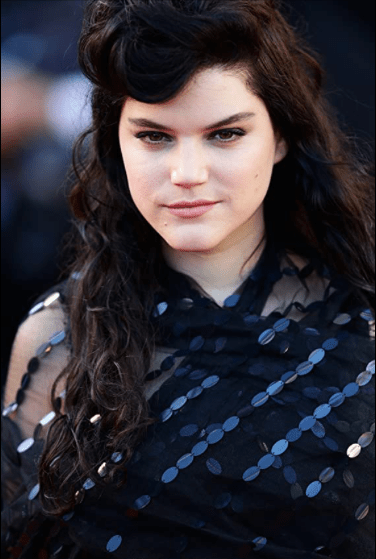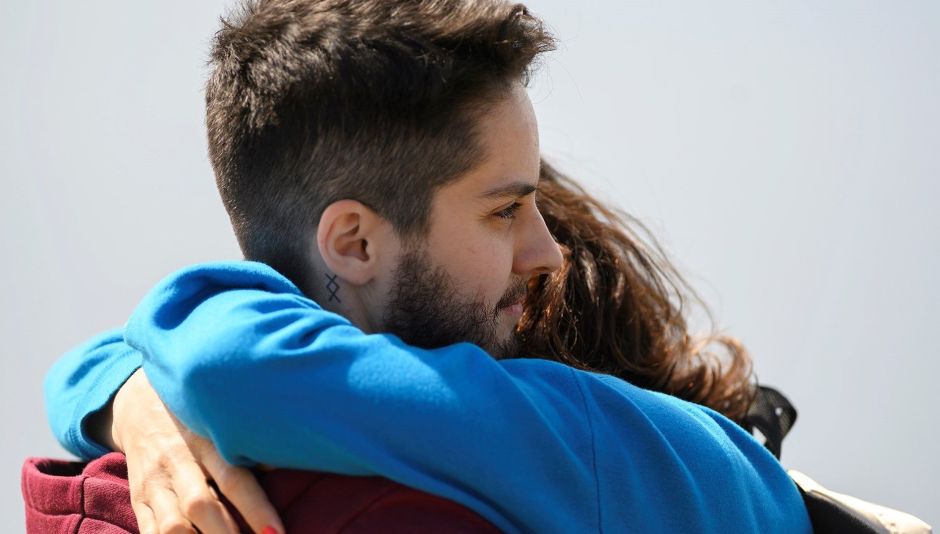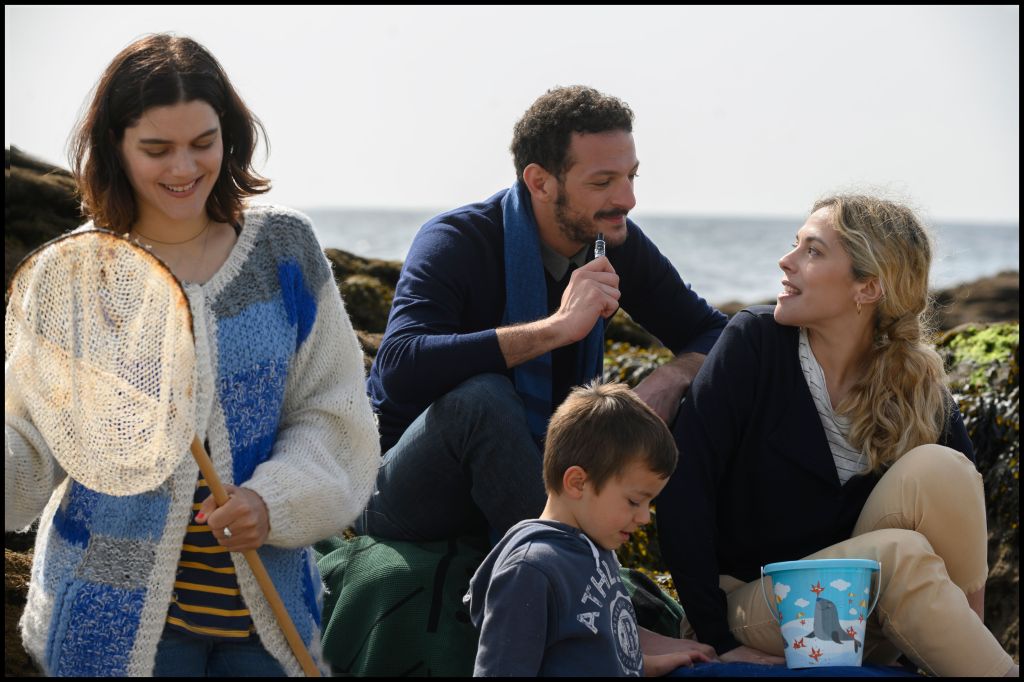During this year’s Toronto International Film Festival, I got the opportunity to screen the touching French film “A Good Man.” It’s the story of Ben, a transgendered man, and his wife Aude and their struggles to start a family. While very authentic and persona, the film comes across as universal in its themes of motherhood and love. Starring French actresses Noémie Merlant and Soko, both of whom give stirring and memorable performances, “A Good Man” tugs at every heartstring and leaves us — the viewers — questioning our preconceived notions of motherhood and femininity.
I recently had the pleasure to chat (and brush up on my French comprehension skills) with the actresses about the film, preparing for their respective roles and what they hope to leave behind with their work.
Both actresses have taken challenging roles in their careers so far (Merlant was in last year’s “Portrait of a Lady” and this year’s “Jumbo” — currently making the festival rounds — while Soko starred in “Her” and “La danseuse“ ) but say they are attracted to these types of roles. “I use that sense of vertigo to serve the performance…to be present in the scene that I am playing. I use that to prepare and focus on the role” says Merlant. “I love challenging roles and like to completely disconnect to become someone new. The first thing I do is change my perfume. I always like to question, ‘what is the perfume of my character?’” chimes in Soko. “I’m so connected to my senses so I’m always thinking ‘what would that girl wear?’ Its funny though because I always have to consult with my girlfriend to make sure its ok that I’m wearing this for two months” she says laughing. “I love diving in straight and losing myself in things. I remember people telling me that for my role in “The Dancer” (Soko plays Marie-Louise Fuller the toast of the Folies Bergéres at the turn of the 20th century) that I really needed to protect myself because she was so destructive…but how? How do I do that? And I definitely hurt myself and its super challenging to get out of a story that you dive fully into.” Soko continues, “but for this role, it was more about being there for representation and visibility for the Queer community, as I am sharing my life with a women and raising my child with a woman.” The actress knew that this was a part she really wanted when she read the script and heard that the other two women they were auditioning were straight and that Noémie was already attached to the project. “If you’re hiring two cis women to play a queer couple, this is gonna suck and it’s gonna be really bad for you! You really need me to be a part of this to get a bit more credibility. We see even with doing so and having a little bit of representation in the film, there is still a polemic about Noémie’s character” she goes on to say.

The film received some blowback from the trans community because the role of Ben was played by a cis-gendered woman, at a time when Hollywood and the international film community are going through a period of reckoning about its lack of representation of people from marginalized populations. “As a proud member of the community, I feel a little pride knowing that an effort was made in that direction, not for the trans community but at least for the LGBTQIA+ community” says Soko. (I also got a chance to chat with the director of the film about this so stay tuned for that interview.) When asked about the progress of representation for her community, she says “we still have a ways to go…not only LGBTQ versus cis people but also between races, genders…we’re still all fighting the same fight. As long as there are people in power like Donald Trump I don’t thinks it’s going anywhere – there’s still a lot of changes to be done around the world.”
Merlant adds “As Soko said, we have a very long way to go. It’s wonderful telling stories like this but I think it’s more important that people from the LGBTQ community are telling their own stories and represented as actors. Cinema is supposed to represent the entire world. It’s important that minorities and people who are oppressed are represented on screen – that’s far from being the case at the moment. It’s important that people whose lives are so different find a place in the cinema.” She goes on “for Marie-Castille (the director) I think it was very important for her to tell a story like this and present other stories about access to having children for trans couples – something that hadn’t been depicted on the screen before — so that was important.” Merlant acknowledges that some progress is being made but feels, “we have to go even further with that. I very much wanted to play the part, but I as a cis-actor playing a trans role feel that it’s very important that trans actors are given the opportunity to play these roles on screen. Of course as an actress you’re trying to put yourself in the skin of someone else and play something you’re not, but it’s important that trans people be allowed to represent themselves on the screen.” She continues, “often times when casting, they are looking for someone with experience and someone who is ‘bankable’ — right now, there aren’t really trans actors who fit that bill – but they won’t get that experience unless we make an effort and go out of our way to nurture that talent.”
When asked about what really drew them to these characters and this project, Merlant says “when I first read the script I thought it was amazing – I was very moved by the character and I felt the film had so much to say as a story that we rarely see on screen. The positive approach to their struggle. Ben was an amazing character – very strong, brave and accepting of himself. We don’t talk about the transition in the past, but we accept him as he is now. He’s happy and he has a place in society in which he is comfortable, but now he has the desire to fight for access to paternity. I also love that the film wasn’t sensational or voyeuristic.”
The topic of motherhood is very sensitive and the conversations around it are different around the world. When asked about those limitations and conversations in France, Soko replies “there are a ways to go until there is equality in that area. It’s still very complicated to procreate as a single mother and have access to IVF or adopting as a single mom. It’s hard for LGBTQIA+ couples to have access. Most of the time you have to go to another country. It’s a lot easier in the U.S., but it’s also not fair at all because it’s a very costly process. That’s why it’s so hard for most people with a desire to have kids – any minorities but also people who don’t live in the example of a ‘normal’ cis straight couple. It’s a hard fight for years – not just emotional but fighting with your body and the feeling of shame. Everyone should be able to procreate as they wish. Giving life is a beautiful thing and even having one loving parent is better than two parents that fight and don’t give the best to their kid.”
“As Soko said, we have a ways to go. The necessity to give trans couples the right to have children is important. Right now in France, IVF is forbidden for trans couples” says Merlant. Soko interjects, “even in the film, they have to go to Belgium to have the procedure.” Merlant continues, “Trans couples are not recognized as biological parents by French law. The trans parent has to adopt their child and that process is very difficult. Courts won’t often recognize them. It’s important that rights be recognized for all. In the film, Ben and Aude are a very strong couple who are going to make very loving parents.” Merlant did a lot of research for the role and goes on to say “even with the new bio-ethics law being tabled, that right still isn’t extended or recognized for these couples.” We could talk for hours about this.

On a somewhat lighter topic, when asked about how being a singer/actress during the digital age and having access to social media influences her career, Soko references Netflix’s new hybrid documentary “The Social Dilemma.” “For me, being able to tell my own story and it not being filtered through journalists is great. When I started in this industry, I was 19 and there was no social media other than Myspace. I couldn’t really connect with people and express myself fully and my message was still filtered through journalists and all that was written was their experience of me — not my truth. Now, being a queer actor-musician-mom, it’s a great gift that I have through which I can share my story.”
After some back and forth in French to wrap the conversation up, we talked about what the two actresses really hope people take from this film and what legacy they want to leave behind with their work. “I’ll say two things about what I want the audience to take away from this. First, for cis spectators who watch the film, I want them to come away aware of the problems these couples are facing and that the desire is the same as with any couple. At the same time, I want them to be aware that trans couples have to fight harder to achieve this. The struggle that we don’t see in the film (the transitioning) and the struggle for access to have children” says Merlant. “Secondly, I hope that trans couples who see the film, who might want to have children, can see a couple who achieved a family in a very positive environment. It will be a struggle, but it is possible.” With a smile, Soko adds, “everything that Noémie said is perfect. And in terms of the second part of the question – the legacy – personally, because I also make music, I hope that the world is a better place for my kid — better than the world I had. By the time I die I wish to have made people feel understood — to help grow their compassion. I hope that some of my work opens people’s eyes to the differences we have but also help them have more empathy and compassion for where we come from so that all of our differences become our strengths.”

I would like to thank Noémie Merlant and Soko for taking the time to chat with me. “A Good Man” is currently making the festival rounds and will hopefully be available stateside in the near future!
